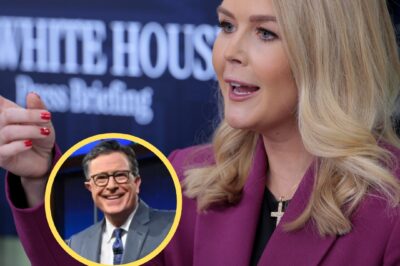The Moment That Shook The Media: Karoline Leavitt’s Bold Challenge to The View
For a show known for fierce debates and intense clashes, The Five on Fox News doesn’t often create moments that cross political lines. However, when White House Press Secretary Karoline Leavitt appeared on the panel recently, the dynamic changed significantly. In a sharp 40-second remark, Leavitt thrust herself into the national spotlight by directly challenging the hosts of The View—particularly Whoopi Goldberg—in a move that would spark a media storm lasting for days.
Initially, the segment was meant to be a routine discussion about media credibility, but it quickly escalated into a heated critique that reverberated across social media and traditional platforms, generating millions of views and sparking widespread conversation. The question raised by Leavitt’s comment was far more profound than just media banter: Was her statement a brave truth-telling moment, a necessary call-out, or did it cross a line?
Setting the Stage
 Karoline Leavitt, the youthful yet experienced press secretary under President Trump’s second administration, is known for her direct, no-nonsense approach. During a discussion on public trust in media, her moment to speak came when Jesse Watters casually asked for her opinion on how shows like The View influence American political perceptions.
Karoline Leavitt, the youthful yet experienced press secretary under President Trump’s second administration, is known for her direct, no-nonsense approach. During a discussion on public trust in media, her moment to speak came when Jesse Watters casually asked for her opinion on how shows like The View influence American political perceptions.
After a brief pause, Leavitt responded with a remark no one saw coming:
“Well, Whoopi Goldberg—who can barely keep a straight face on her own show—is suddenly offering political advice to the nation? If I wanted a daily dose of uninformed chaos, I’d turn on The View… oh wait, I already do.”
The studio fell into stunned silence at first, followed by bursts of laughter. The panelists were alternately shocked, amused, and impressed. But Leavitt wasn’t done.
Substance Behind the Spark
After the initial sting, Leavitt quickly shifted gears, grounding her argument in a more substantial critique.
“Look, it’s not about disagreement; it’s about format. The View doesn’t exist to inform—it exists to incite. It rewards heat over clarity, and that’s dangerous in an election year.”
This reframing transformed her comment from a personal jab into a more systemic critique, elevating it from a soundbite to a meaningful discourse. Almost immediately, the internet exploded.
Hashtags like #KarolineUnfiltered and #TheViewClapback quickly trended on social media. Conservative pundits hailed her remark as overdue truth-telling, while liberal commentators accused her of disrespecting women in the media.
Conservative commentator Allie Beth Stuckey tweeted, “Karoline said what millions have been thinking. Brave and necessary.” Charlie Kirk echoed the sentiment, calling Leavitt “a fearless Gen Z voice we desperately need.”
On the other side, critics from more progressive viewpoints expressed outrage. The View’s Sunny Hostin notably framed Leavitt’s remark as an attempt to “belittle women for using their voices,” positioning the incident within a broader critique of gender dynamics in media.
Whoopi Goldberg responded indirectly, but pointedly, on air the following day, asserting, “When people say things about this show without ever having sat at this table, it says more about them than us.” Joy Behar dismissed Leavitt’s critique lightly, referencing the enduring popularity and longevity of the show.
A Divided Public Opinion
Online forums and comment sections revealed deep divisions among viewers. Supporters praised Leavitt for her poise and sharpness, appreciating her ability to express widespread frustrations concisely. Critics, however, argued that her remark epitomized the degradation of political discourse, worried that public figures were increasingly rewarded for provocative rhetoric.
The segment underscored a broader fatigue among American audiences—across ideological spectrums—regarding overly confrontational political media. It raised questions about the purpose and impact of popular political commentary formats in shaping public understanding.
Leavitt Clarifies Her Position
In a subsequent radio interview in New Hampshire, Leavitt calmly elaborated on her position:
“I’m not here to attack people personally. But when a platform consistently frames conservatives negatively, it’s fair to point it out. My job is to speak truth, not win popularity contests.” Her more nuanced clarification further endeared her to conservative audiences while prompting begrudging acknowledgment from critics.
The Future of Political Media?

Her performance highlights a rising public expectation for authenticity over polished media performances. Leavitt exemplifies a new breed of communicator willing to navigate the complexities of digital virality and media scrutiny without compromising her core messages.
Implications and Legacy
As the controversy continues to reverberate, it poses profound implications for future political discourse. It forces media outlets to reconsider their approaches—emphasizing the balance between provocative content and informative journalism. For conservatives, it marks a pivotal moment in asserting media representation and narrative control.
Leavitt’s engagement also highlights generational shifts within conservative circles, where younger voices like hers are gaining prominence precisely because they effectively harness modern media’s interactive, viral nature to amplify their messages.
Conclusion: A Moment Beyond Itself
Karoline Leavitt’s confrontation with The View, and her direct challenge to Whoopi Goldberg, has become more than just an isolated incident of media friction. It serves as a critical commentary on contemporary political media culture, showcasing the complex interplay between ideology, gender, generational dynamics, and media representation.
The reaction it generated—a mixture of praise, criticism, and extensive public dialogue—indicates that her brief moment on air struck a nerve. Whether perceived as refreshingly honest or disappointingly provocative, Leavitt’s commentary is a potent reminder of the growing demand for authentic and meaningful political dialogue.
In a media environment saturated with superficial conflicts, Karoline Leavitt’s confrontation stands out—not just for its brevity and clarity, but for its willingness to question the underlying assumptions of one of America’s most influential daytime shows. As she continues her tenure as press secretary, her legacy will inevitably reflect a broader narrative about the evolving nature of media, politics, and public discourse in contemporary America.

News
Caught Off Guard! Jen Psaki Drops a Photo B0mbshell That Leaves Kristi Noem Frozen on Air
It was the kind of silence that only happens on Capitol Hill when someone realizes they’ve been cornered. The kind…
🎭 Colbert’s Worst Nightmare? Karoline Leavitt Crashes the Show and Sparks Unscripted Meltdown on Live TV!
The Ed Sullivan Theater crackled with electricity on the night that political commentator Karoline Leavitt faced off with late-night host…
🧩Presidential Puzzle: How Karoline Leavitt’s Husband Is Tied to a Former Commander-in-Chief
The real estate developer shared his plans to own a sports team DONALD Trump’s press secretary Karoline Leavitt has a…
Karoline Leavitt on the Edge? Sydney Thomas Sends Shockwaves with Bold Offer to End Billionaire Drama!
Fans are clearly loving the idea VIRAL boxing ring girl Sydney Thomas has offered to replace White House Press Secretary…
No Mercy! Karoline Leavitt’s Scorching Words Shut Down ‘The View’ in Live Showdown 💣📺
Karoline Leavitt Confronts Viral Mockery—And Walks Through It with the Poise of a Queen on Her Royal Tour It all…
Silent Power! Karoline Leavitt Shuts Down Explosive Media Rumors Without Saying a Word 🔥
Karoline Leavitt Confronts Viral Mockery—And Walks Through It with the Poise of a Queen on Her Royal Tour It all…
End of content
No more pages to load









